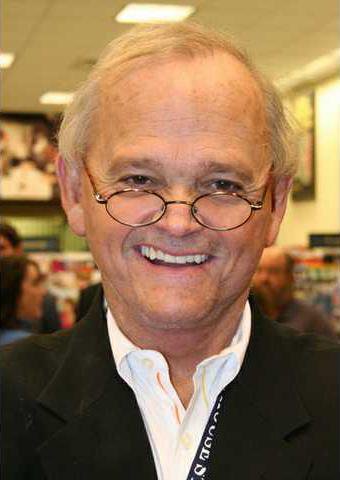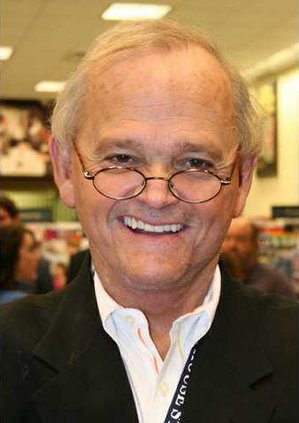0308HARRISaud
"Mr. Doubletalk," Durwood Fincher, double talks in an interview with The Times.Durwood Fincher is one of the few people who actually loves telemarketing calls. One of his friends asked if his telephone number was on the "do not call" list.
"No," he said, "and don't even think about putting it there."
Fincher, 61, was discovered years ago by the late Allen Funt, host of "Candid Camera," who dubbed him "Mr. Doubletalk."
Fincher is a double talker. He has the uncanny ability to throw a few nonsensical syllables inside a sentence. Double talking has made Fincher a wealthy man. It also renders telemarketers nearly speechless.
In recent years, he has made numerous appearances with Regis Philbin and either Kathie Lee Gifford or Kelly Ripa.
Last year, it was his friendship with Gifford that led to an appearance on the "Today" show on NBC, where he double talked Matt, Meredith and Al on tape and did a live double talking interview with Hoda Kotb.
I visited with Durwood recently, along with his biographer, the legendary Ed Grisamore of The (Macon) Telegraph.
Durwood's story is rags to riches on a sometimes bumpy road. "Once You Step in Elephant Manure, You're in the Circus Forever," was released earlier this year.
Durwood grew up in Payne City, a cotton mill community located in Macon. After his father left, his mother struggled working in the mill to provide for Durwood and his older brother, Roy.
Not much was expected of the children of the mill village, but Durwood went to Georgia Southern and became a teacher. About the time he was graduating at Statesboro, his mother's job at the Payne City mill was coming to an end. He arranged a job interview for her at the school and when Durwood Fincher left, Ella Mae Fincher moved in and became a dorm mother.
Though gone for many years, "Ma" Fincher remains a legend on the campus at Statesboro.
The book tells Durwood's complete story, including his struggle with drug addiction.
But it also tells the story of a man who truly loves people, particularly the underdogs. He has helped people living on the streets of Atlanta without recognition, and he is quick to reach into his cluttered briefcase and pull out a $20 to help someone in need.
His career breakthrough in double talking came through performances for IBM at the time they were introducing personal computers. He often bills himself as Dr. Robert Payne, an expert on the topic at hand. His double talking has the audience in suspense at first, wondering what is wrong with this man. Once they catch on, he has them rolling in the aisles.
He appeared in Gainesville last year at the Rotary Club's annual dinner.
Durwood Fincher was expected to be like other children of the village and become a "linthead" and work in the mill. A counselor in his high school actually discouraged him from going to college, suggesting the mill route might be best for him.
Fincher said he thought about that woman during one of his national TV appearances.
"I wonder if she's watching TV right now," he remembers thinking at the time.
Talking with Durwood Fincher is like talking with an old friend. He eyes well up with tears when he talks about his late mother and brother. I like anybody who's not afraid of their emotions.
The book is a great read and I recommend it. It comes with a DVD of some of Durwood's TV and video antics.
It is available through his Web site, Doubletalk.com.
Harris Blackwood is community editor of The Times. His columns appear Wednesdays and Sundays.

